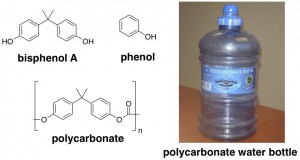 While those of us in the US were busy stuffing ourselves with turkey on Thursday, the European Commission was hard at work making a decision about a proposed ban on the chemical bisphenol A (BPA). On the basis of an assortment of studies suggesting a link between BPA and various health conditions, Europe agreed to ban BPA from all baby bottles in the European Union.
While those of us in the US were busy stuffing ourselves with turkey on Thursday, the European Commission was hard at work making a decision about a proposed ban on the chemical bisphenol A (BPA). On the basis of an assortment of studies suggesting a link between BPA and various health conditions, Europe agreed to ban BPA from all baby bottles in the European Union.
This decision is being called a “better-safe-than-sorry” approach. Though scientific evidence indicting BPA as a health hazard has been slowly mounting, it is still insufficient to really draw any definitive conclusions. So far the US FDA hasn’t found the evidence convincing enough to warrant a ban. Apparently, Europe isn’t really sure either. In fact, just a couple of months ago, they reviewed the research on BPA and released a statement saying that they saw no reason to tighten any restrictions on it.
What is bisphenol A? As suggested by its name, BPA is a molecule that features two phenol units. BPA is the primary building block for a common type of polycarbonate plastic – a sturdy plastic that is often used for things like baby bottles. Or Nalgene water bottles before they switched over to non-BPA plastic.

What is BPA accused of? The concern is that BPA can leach out of plastics and then be ingested by humans. Recent studies have linked high BPA levels in humans with increased risk of heart disease and DNA damage to sperm. (Though remember that correlation does not imply causation.) Another study published last month demonstrated that BPA can be absorbed through the skin, not just by ingestion (in this case, off of thermal paper such as receipts).
What evidence isn’t there? No studies have demonstrated a cause-and-effect relationship between BPA and health problems, at least not at the low doses that are possible from, say, regularly drinking out of a polycarbonate water bottle. This statement from the European Food Safety Authority gives a lengthy account of why the scientific evidence for BPA causing health problems is inconclusive.
What should you do? If you are concerned about BPA, it is worth taking a look at the evidence. Keep the source in mind (perhaps a polycarbonate manufacturer could be a little biased, and a conspiracy website will be a little extreme). Also remember that correlation does not equal causation. Meanwhile, do avoid washing anything made of polycarbonate with bleach. Bleach starts to break down the plastic, releasing BPA.

